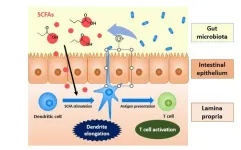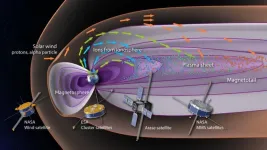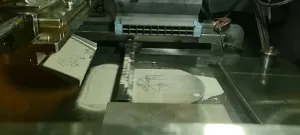(Press-News.org) Dendritic cells play a key role in the mammalian immune system. These cells are present throughout the human body and are known to capture foreign bodies, i.e., antigens, using extendable “arms” called dendrites. Once captured, dendritic cells present these substances to immune T cells, thereby initiating an immune response. Dendritic cells are responsive to their environment and capable of changing their morphology and other attributes dynamically. For instance, dendritic cells in the intestine’s mucosa (inner layer) capture harmful bacteria by extending their dendrites through the epithelium (outermost layer) and into the intestinal lumen (inner space). However, the exact mechanism through which they do is not clear.
In a study that was published in The FEBS Journal on August 30, 2023, a team of researchers led by Associate Professor Kazuyuki Furuta, Mr. Takuho Inamoto, Dr. Kazuya Ishikawa, and Dr. Chikara Kaito from the Graduate School of Medicine, Dentistry, and Pharmaceutical Sciences at Okayama University, Japan found that short-chain fatty acids (SCFAs) produced by intestinal bacteria are responsible for initiating the extension of dendrites into the intestinal lumen by dendritic cells.
SCFAs are a group of fatty acids with six or fewer carbon atoms, found in high concentrations in the intestine. The research team found that SCFAs such as acetic, propionic, butyric and valeric acids induce dendrite elongation by inhibiting an enzyme called histone deacetylase. Inhibition of histone deacetylase leads to the reorganization of the actin cytoskeleton of dendritic cells, inducing morphological changes. To arrive at these findings, the team examined the effects of SCFAs on a dendritic cell line (DC2.4 cells) and mouse bone marrow-derived dendritic cells (BMDCs) in a laboratory setting.
“Ours is the first study to demonstrate that SCFAs induce dendrite elongation by inhibiting histone deacetylase. Moreover, dendritic cells activated by SCFAs exhibited more stronger immune responses, due to increased pathogen uptake,” explains Dr. Furuta.
Upon conducting further analyses, the team found that treating dendritic cells with valeric acid led to an increase in the uptake of soluble proteins, insoluble beads, and Staphylococcus aureus bacteria. In contrast, the treatment of BMDCs with valeric acid enhanced their antigen presentation ability. It was also observed that SCAFs activated dendrite elongation by stimulating a signaling pathway involved in reorganization of the actin cytoskeleton—forces responsible for cell movement and cell morphology.
So, what are the implications of these findings? “Our findings may be leveraged to identify beneficial intestinal bacteria producing SCFAs to activate immune responses and aid in the prevention of diseases. In addition, the dendritic elongation mechanism we discovered can be used as a target to develop drugs regulate immune responses artificially,” remarks Dr. Furuta.
By revealing the exact mechanism through which SCFAs trigger dendritic elongation, this study has paved the way for new drugs that directly target dendritic cells. We cannot wait to see these new treatments unfold!
About Okayama University, Japan
As one of the leading universities in Japan, Okayama University aims to create and establish a new paradigm for the sustainable development of the world. Okayama University offers a wide range of academic fields, which become the basis of integrated graduate schools. This not only allows us to conduct the most advanced and up-to-date research, but also provides an enriching educational experience.
Website: https://www.okayama-u.ac.jp/index_e.html
About Associate Professor Kazuyuki Furuta from Okayama University, Japan
Dr. Kazuyuki Furuta is an Associate Professor at the Graduate School of Medicine, Dentistry, and Pharmaceutical Sciences at Okayama University, Japan. He has over 20 years of research experience and has published over 43 scientific papers in the vast field of immunology, focusing primarily on the mechanisms and functions of mast cells, histamines, Histidine Decarboxylase, Immunoglobulin E, dendritic cells, antigen presentation, Major Histocompatibility Complex, and more. He was previously affiliated with NIH National Cancer Institute, USA and Mukogawa Women's University, and has been cited several times.
END
Intestinal bacteria metabolite promotes capture of antigens by dendritic cells
Researchers discover that short-chain fatty acids trigger elongation of dendrites by dendritic cells to capture intestinal pathogens
2023-10-30
ELSE PRESS RELEASES FROM THIS DATE:
Virtual meetings tire people because we're doing them wrong
2023-10-30
New research suggests sleepiness during virtual meetings is caused by mental underload and boredom. Earlier studies suggested that fatigue from virtual meetings stems from mental overload, but new research from Aalto University shows that sleepiness during virtual meetings might actually be a result of mental underload and boredom.
‘I expected to find that people get stressed in remote meetings. But the result was the opposite – especially those who were not engaged in their work quickly became ...
The importance of the Earth’s atmosphere in creating the large storms that affect satellite communications
2023-10-30
A study from an international team led by researchers from Nagoya University in Japan and the University of New Hampshire in the United States has revealed the importance of the Earth’s upper atmosphere in determining how large geomagnetic storms develop. Their findings reveal the previously underestimated importance of the Earth’s atmosphere. Understanding the factors that cause geomagnetic storms is important because they can have a direct impact on the Earth’s magnetic field such ...
Using lasers to ‘heat and beat’ 3D-printed steel could help reduce costs
2023-10-30
Researchers have developed a new method for 3D printing metal that could help reduce costs and make more efficient use of resources.
The method, developed by a research team led by the University of Cambridge, allows structural modifications to be ‘programmed’ into metal alloys during 3D printing, fine-tuning their properties without the ‘heating and beating’ process that’s been in use for thousands of years.
The new 3D printing method combines the best qualities of both worlds: the complex shapes that 3D printing makes possible, and the ability to engineer ...
Positive messages can mitigate harm from objectified fitness posts
2023-10-30
PULLMAN, Wash. – A few words of body appreciation can help counter the negative impact of viewing objectified images of female fitness influencers, according to a Washington State University study.
While fitness influencers say they want to inspire good physical health, research has found that their social media posts often inspire negative mental health, especially among younger women. The WSU experimental study, published in the journal Health Communication, revealed that the negative impact ...
Extreme heat projected to increase cardiovascular deaths
2023-10-30
For immediate release on Oct. 30, 2023 at 5 a.m. ET
Cardiovascular-related deaths due to extreme heat are expected to increase between 2036 and 2065 in the United States, according to a study supported by the National Institutes of Health. The researchers, whose work is published in Circulation, predict that adults ages 65 and older and Black adults will likely be disproportionately affected.
While extreme heat currently accounts for less than 1% of cardiovascular-related deaths, the modeling analysis predicted this will change because of a projected rise in summer ...
Heat-related cardiovascular deaths in the U.S. may more than double within decades
2023-10-30
Research Highlights:
Cardiovascular deaths from extreme heat in the United States are projected to increase by 162% by the middle of the century, based on a hypothetical scenario where currently proposed U.S. policies to reduce greenhouse gas emissions have been successfully implemented.
A more dire scenario forecasts cardiovascular deaths from extreme heat could increase by 233% in the next 13-47 years if there are only minimal efforts to reduce emissions.
The percentage increase in deaths ...
Penn research projects increase in US cardiovascular deaths due to extreme heat
2023-10-30
PHILADELPHIA— The number of heat related cardiovascular deaths in the United States will increase over the next four decades, according to a new analysis from the Perelman School of Medicine at the University of Pennsylvania. Extreme heat can impact heart health in many ways, including increased heart rate, changes in blood pressure, and increased inflammation. Left untreated, these issues can be deadly. The findings, published today in Circulation, also indicate that older adults and Black adults will experience greater increases in excess cardiovascular deaths due to extreme heat.
“As global temperatures rise, analyzing how demographic and environmental trends ...
Child Development Perspectives Journal Q&A: analyzing the stereotypes of adolescence
2023-10-30
In Western cultures, adolescence is often viewed as a time of rebellion and irresponsibility. A new article published in the journal Child Development Perspectives synthesized recent research on stereotypes of adolescence using an interdisciplinary approach which integrates developmental psychology, cultural psychology, and neuroscience.
The findings highlight the importance of avoiding the “one-size fits-all” assumptions about teen stereotypes across different cultures. In particular, the research ...
Trauma-informed training workshops prompt meaningful individual and organizational changes, according to outcomes surveys
2023-10-30
A McLean Hospital study of 598 people across various industries who underwent a two-day training workshop where they learned about trauma-informed care and how to deploy these skills within their organizations, found participants reported significant gains in knowledge of trauma and made improvements to organizational policies, according to a comparison of survey data collected before and after the trainings.
Among those trained, who included nurses, CEOs, academics and corrections officers, post-survey scores increased ...
Study of 1,000 selfies helps explain how we use them to communicate
2023-10-30
People have used self-portraits to communicate information about themselves for centuries — and digital cameras make it easier to share a self-portrait than ever before. But even though selfies are now almost ubiquitous, we don’t understand how people use them to communicate. So scientists from the University of Bamberg set out to investigate the semantics of selfies.
“Although the term ‘selfies’ is now celebrating its 21st birthday, and although selfies are known in art history for nearly 200 years in photography and more than 500 years in paintings, we still lack a clear classification of the different types of selfies,” ...
LAST 30 PRESS RELEASES:
For solar power to truly provide affordable energy access, we need to deploy it better
Middle-aged men are most vulnerable to faster aging due to ‘forever chemicals’
Starving cancer: Nutrient deprivation effects on synovial sarcoma
Speaking from the heart: Study identifies key concerns of parenting with an early-onset cardiovascular condition
From the Late Bronze Age to today - Old Irish Goat carries 3,000 years of Irish history
Emerging class of antibiotics to tackle global tuberculosis crisis
Researchers create distortion-resistant energy materials to improve lithium-ion batteries
Scientists create the most detailed molecular map to date of the developing Down syndrome brain
Nutrient uptake gets to the root of roots
Aspirin not a quick fix for preventing bowel cancer
HPV vaccination provides “sustained protection” against cervical cancer
Many post-authorization studies fail to comply with public disclosure rules
GLP-1 drugs combined with healthy lifestyle habits linked with reduced cardiovascular risk among diabetes patients
Solved: New analysis of Apollo Moon samples finally settles debate about lunar magnetic field
University of Birmingham to host national computing center
Play nicely: Children who are not friends connect better through play when given a goal
Surviving the extreme temperatures of the climate crisis calls for a revolution in home and building design
The wild can be ‘death trap’ for rescued animals
New research: Nighttime road traffic noise stresses the heart and blood vessels
Meningococcal B vaccination does not reduce gonorrhoea, trial results show
AAO-HNSF awarded grant to advance age-friendly care in otolaryngology through national initiative
Eight years running: Newsweek names Mayo Clinic ‘World’s Best Hospital’
Coffee waste turned into clean air solution: researchers develop sustainable catalyst to remove toxic hydrogen sulfide
Scientists uncover how engineered biochar and microbes work together to boost plant-based cleanup of cadmium-polluted soils
Engineered biochar could unlock more effective and scalable solutions for soil and water pollution
Differing immune responses in infants may explain increased severity of RSV over SARS-CoV-2
The invisible hand of climate change: How extreme heat dictates who is born
Surprising culprit leads to chronic rejection of transplanted lungs, hearts
Study explains how ketogenic diets prevent seizures
New approach to qualifying nuclear reactor components rolling out this year
[Press-News.org] Intestinal bacteria metabolite promotes capture of antigens by dendritic cellsResearchers discover that short-chain fatty acids trigger elongation of dendrites by dendritic cells to capture intestinal pathogens



